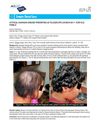 December 2022 in “Rossijskij žurnal kožnyh i veneričeskih boleznej”
December 2022 in “Rossijskij žurnal kožnyh i veneričeskih boleznej” New treatments for child hair loss due to immune issues are effective but not yet officially approved.
 October 2022 in “Portuguese journal of dermatology and venereology”
October 2022 in “Portuguese journal of dermatology and venereology” The best concentration of triamcinolone acetonide for treating alopecia areata is still unclear.
[object Object]  October 2022 in “Pediatric Dermatology”
October 2022 in “Pediatric Dermatology” Most children with rapid hair loss had a known cause, with stress and illness being top triggers, and treatments showed similar improvement.
 October 2022 in “Benha Journal of Applied Sciences”
October 2022 in “Benha Journal of Applied Sciences” Human Beta Defensin 1 levels do not predict the risk or severity of Alopecia Areata.
 August 2022 in “Frontiers in genetics”
August 2022 in “Frontiers in genetics” A new genetic change in the DSC3 gene is linked to a rare condition causing hair loss and skin blisters in a child.

Hair loss after COVID-19 is common, starts sooner in severe cases, and often comes with scalp pain.

Early identification of lupus through skin signs and blood tests is crucial in India.
 April 2022 in “Cermin Dunia Kedokteran”
April 2022 in “Cermin Dunia Kedokteran” Accurate diagnosis and understanding of alopecia areata in children are crucial for proper treatment.
March 2022 in “Authorea (Authorea)” Chemotherapy for leukemia led to full hair regrowth in a child with alopecia totalis.

Fire needle therapy's benefits and safety for alopecia areata need more evidence.
January 2022 in “Clinical Cases in Dermatology” A 22-year-old man has alopecia areata, an autoimmune hair loss condition, with various treatments available.
 November 2021 in “CRC Press eBooks”
November 2021 in “CRC Press eBooks” Anagen effluvium is a reversible condition causing sudden hair loss, often due to chemotherapy or head radiation.
 September 2021 in “CRC Press eBooks”
September 2021 in “CRC Press eBooks” Lupus can cause a type of hair loss that doesn't scar, due to inflammation.
 August 2021 in “EMC - AKOS - Trattato di Medicina”
August 2021 in “EMC - AKOS - Trattato di Medicina” Acquired alopecia is hair loss that can be reversible or irreversible, depending on whether the hair follicle is destroyed.
 May 2021 in “Journal of the American College of Cardiology”
May 2021 in “Journal of the American College of Cardiology” An 11-year-old girl with Kawasaki disease experienced hair loss that improved after treatment.
 April 2021 in “International Journal of Research in Dermatology”
April 2021 in “International Journal of Research in Dermatology” A child with a rare scalp condition regrew hair after treatment.
 March 2021 in “Annals of Translational Medicine”
March 2021 in “Annals of Translational Medicine” Two patients with lupus had an unusual type of hair loss not typical for the disease.
 January 2021 in “International journal of dermatology, venereology and leprosy sciences”
January 2021 in “International journal of dermatology, venereology and leprosy sciences” Trichoscopy shows black dots, yellow dots, and empty follicles are common in Alopecia Areata, with broken and exclamation mark hair as typical patterns.
December 2020 in “Journal of Face Aesthetics” Trichoscopy effectively helps diagnose different types of hair loss in women.
 September 2020 in “Osmangazi tıp dergisi”
September 2020 in “Osmangazi tıp dergisi” Thyroid dysfunction, vitamin D and B12 deficiencies, and iron deficiency may be linked to hair loss condition Telogen Effluvium.
 December 2019 in “Journal of pediatrics & neonatology”
December 2019 in “Journal of pediatrics & neonatology” A 13-year-old boy had a rare, stable type of hair loss with little chance of regrowth, but treatment is available for looks.
Loose anagen syndrome causes easy hair shedding in children, often resolving on its own.
[object Object]  July 2019 in “International journal of dermatology, venereology and leprosy sciences”
July 2019 in “International journal of dermatology, venereology and leprosy sciences” Oral cyclosporine works better than betamethasone minipulse therapy for treating Alopecia Areata.
A 2-year-old boy with a rare type of lupus causing hair loss improved with oral steroids.
 January 2019 in “Medicine Science | International Medical Journal”
January 2019 in “Medicine Science | International Medical Journal” Children with different rheumatologic diseases have specific skin symptoms that can help with diagnosis.
 October 2018 in “InTech eBooks”
October 2018 in “InTech eBooks” The most effective treatments for hair loss are minoxidil, finasteride, PRP, and hair transplants, with steroids and immunosuppressants for autoimmune types.
 July 2018 in “IP Indian journal of clinical and experimental dermatology”
July 2018 in “IP Indian journal of clinical and experimental dermatology” Hair loss in rural Indian children is often due to malnutrition, poor grooming, stress, and infections.
 July 2018 in “Benha Journal of Applied Sciences”
July 2018 in “Benha Journal of Applied Sciences” Higher levels of miR-203 may contribute to hair loss in alopecia areata.
 December 2017 in “Springer eBooks”
December 2017 in “Springer eBooks” Transplant patients often get skin problems, with treatments varying by condition.
 June 2017 in “Reactions Weekly”
June 2017 in “Reactions Weekly” Some breast cancer treatments caused long-term hair loss in women, similar to a condition called alopecia areata.

























